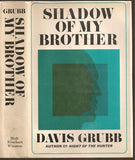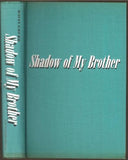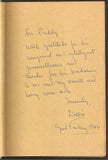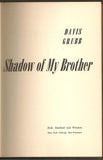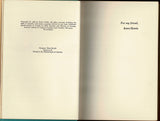Shadow of My Brother
Author: Grubb, Davis Alexander (1919-1980) inscribed
Year: 1966
Publisher: Holt, Rinehart and Winston
Place: New York, Chicago and San Francisco
Description:
317 pages. Octavo (8 1/2" x 6") bound in original publisher's green cloth with white and shadow black to cover and spine in original pictorial jacket. Inscribed by the author. First Edition.
Davis Grubb was an American novelist and short story writer. Born in Moundsville, West Virginia, Grubb wanted to combine his creative skills as a painter with writing and as such attended the Carnegie Institute of Technology in Pittsburgh, Pennsylvania. However, his color blindness was a handicap he could not overcome and as such gave up on painting to dedicate himself to writing fiction. He did however do a number of drawings and sketches during the course of his career, some of which were incorporated into his writings. In 1940, Grubb moved to New York City where he worked at NBC radio as a writer while using his free time to write short stories. In the mid 1940s he was successful in selling several short stories to major magazines and in the early 1950s he starting writing a full length novel. Influenced by accounts of economic hardship by depression-era Americans that his mother had seen first hand as a social worker, Grubb produced a dark tale that mixed the plight of poor children and adults with that of the evil inflicted by others. His first novel, The Night of the Hunter, became an instant bestseller and was voted a finalist for the 1955 National Book Award. That same year, the book was made into a motion picture that is now regarded as a classic. Deemed "culturally significant" by the Library of Congress, the film was selected for preservation in the United States National Film Registry. Davis Grubb went on to write a further nine novels and several collections of short stories. His 1969 novel Fools' Parade would also be made into a motion picture starring James Stewart. Some of Grubb's short stories were adapted for television by Alfred Hitchcock and by Rod Serling for his Night Gallery series. Grubb died in New York City in 1980. His novel Ancient Lights was published posthumously in 1982, and St. Martins Press published eighteen of his short stories in a book collection titled You Never Believe Me and Other Stories.
A young boy is brutally murdered in the Southern town of Elizabethville while five people watch. In Shadow of My Brother Davis Grubb goes back through three generations of the Wilson family to build a narrative of terror-not only of this murder but of the special yet familiar evil that spawned a murderer. In times after that night there were those among them who swore that a single bolt of lightning had slashed through the sky; lighting the faces of the just and the unjust, of sleepers and the watchers of the night, and the slain and the slayers. This is a poignant, unrelenting, almost insufferable description of the pathology of racism and sex, what it portrays about his dimension of the American inheritance is pathetically true and immediately timely.
Condition:
Inscribed on front end paper. Touch of sunning to edges. Jacket lightly soiled, front fold over flap creased, some rubbing to spine ends else a better than very good copy in like jacket.






